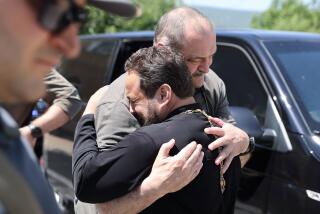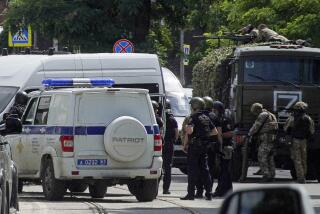Speak the Truth, Russia
- Share via
Chechen militants who seized more than 700 theatergoers in the heart of Moscow, wiring explosives in the building and threatening to kill their captives, ultimately are responsible for the deaths of more than 100 innocent people in the rescue attempt. But Russian refusal to name the gas used and the attempt to blame the deaths on other causes harken back to the Soviet days of Stalin and the gulags, especially now that the government has muzzled much of the media.
Hostages who survived said they feared being killed at any minute, and that indeed was the possibility that prompted the government to act. But the failure to have medical personnel nearby to quickly attend to those overcome by the gas and the refusal to tell hospital doctors what disabling agent was used and what would counteract it were inexcusable.
Government officials initially blamed many of the deaths on Chechen gunfire. But civilian doctors said that among more than 115 victims examined, only two died from bullets. The doctors said most apparently died of poisoning when gas was pumped into the ventilation system, another contradiction of government statements that the gas exacerbated existing conditions like heart and lung problems, which caused the deaths.
An estimated 50 militants were killed and the death toll of hostages could reach 200. Russian President Vladimir V. Putin, who rode to power two years ago by being tough on Chechen separatists, asked the relatives of those killed to “forgive us.” His popularity soared among those rescued, their families and many Russians outraged that the war with a troublesome province in the Caucasus again had been brought to the capital. On Monday, Russian officials accused Al Qaeda of involvement in the hostage-taking, not the first time the government has linked Chechens demanding independence to international terrorists.
Chechen anger at harsh Russian rule dates back centuries, and its targets have included czars, Communists and the post-Soviet government. In 1994, separatists launched a two-year war that ended with a declaration of an independent Chechnya that was recognized by only one other country -- Taliban-ruled Afghanistan. In September 1999, after a series of kidnappings by Chechen warlords and apartment-house bombings elsewhere in Russia that killed several hundred people, Moscow launched another war against the rebels. Both sides have committed atrocities including torture; Russian soldiers call it the “no limits” campaign.
Chechen representatives at a Denmark conference Monday distanced themselves from the hostage-takers and asked Putin to start peace talks. After the weekend’s carnage, it will be easier for the president to vilify the Chechens and more difficult to discuss peace. But such discussion is what’s necessary to stop the spiral of violence. One thing Putin should not do is tolerate the return to the old Russia that lied to its people.
More to Read
Sign up for Essential California
The most important California stories and recommendations in your inbox every morning.
You may occasionally receive promotional content from the Los Angeles Times.










